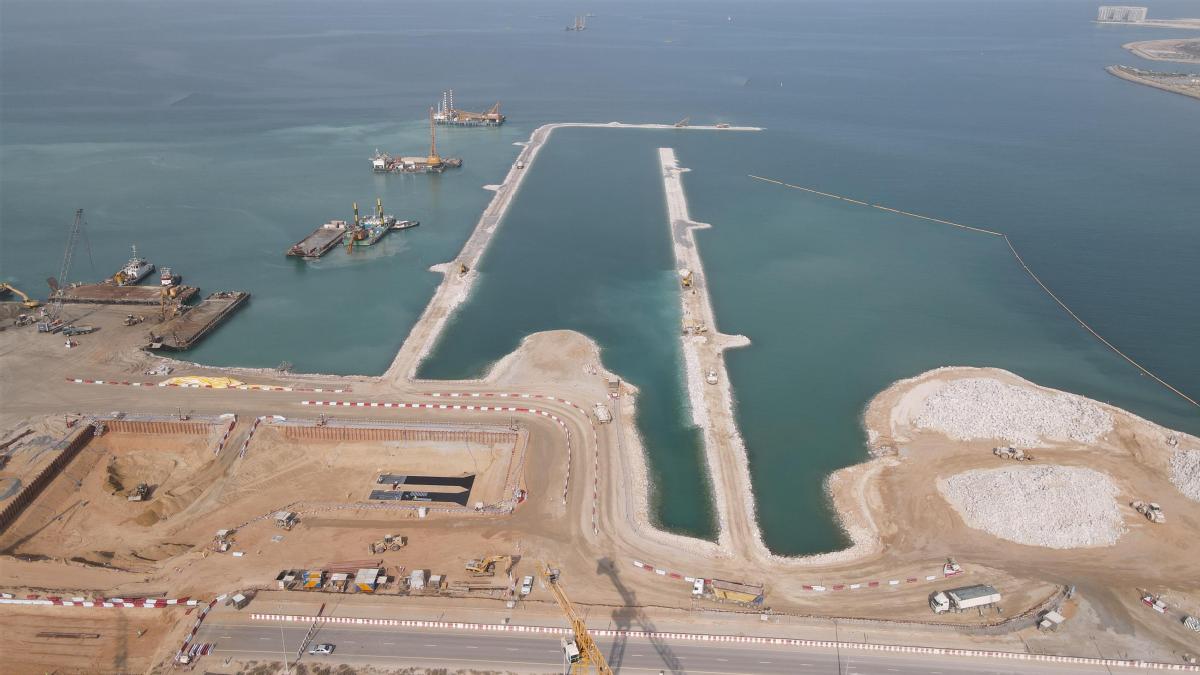BRI contracts bloom in the desert


Chinese construction firm keeps busy in Middle East with project pipeline
Nearly 50 kilometers north of Dubai's city center, a massive seawater desalination plant is taking shape at a site in the United Arab Emirates where the waters of the Persian Gulf meet the desert.
Keeping an eagle eye on construction is Jiang Huairui, project manager of the China Railway 18th Bureau Group, which is the main contractor for the project.
The Umm Al Quwain Independent Water Project is one of many endeavors that the Chinese company is getting off the ground in countries participating in the Belt and Road Initiative.
The plant is projected to provide 682,000 tons of clean drinking water a day to meet the needs of residents and businesses, Jiang said.
"The UAE has a desert climate and faces a shortage of water resources," Jiang said. "This plant is of great importance to ensure the water security of the country and is also one of the world's leading green energy conservation and environmental protection projects."
Gao Jinping, the company's international branch deputy general manager, said that since entering the UAE market 17 years ago, the China Railway 18th Bureau Group has taken on more than 40 projects with a total contract value of more than $1.2 billion. The company began with low-rise residential buildings and has since moved on to skyscrapers, aside from infrastructure projects.
One such building is the Ciel Tower in Dubai's Marina district. The company began construction work in May. When completed, the 368.8-meter tower will be the tallest hotel in the world.
The UAE is a key participant in the BRI, with its involvement also boosting the country's contribution to the 2030 Agenda for Sustainable Development. The desert nation has been steadily increasing its infrastructure investments. This year, it launched a 100 billion dirham ($27 billion) stimulus plan to hasten the economy's recovery from the impact of the COVID-19 pandemic.
"The landmark Ciel Tower will effectively create jobs and boost local economic development," said Gao, adding that the company has taken on six projects this year and has managed to grow its business in the Middle East despite the disruptions caused by the pandemic.
Recalling the early years of the company's push into the region, Gao said that language barriers, cultural differences and unfamiliarity with local laws and industry norms were the main difficulties encountered.
To better integrate with the Middle East market and boost the region's economic development, the company has recruited some 2,770 local employees. Local hires account for 95 percent of the Middle East staff, Gao said.
The company attaches great importance to smoothing cultural differences and respecting religious customs in the Middle East. Muslim workers take Fridays off and Chinese employees refrain from drinking alcohol in public.
Development blueprint
Gao said the Middle East is an important market for his company and figures prominently in its overall overseas development blueprint. He lists the UAE, Saudi Arabia and Qatar as the main markets in the region.
"Chinese enterprises have great opportunities in the region, and Arab people, who focus on building good business relationships of mutual trust, are friendly to work with," Gao said. "We would like to bring China's domestic advanced and mature urban construction technologies and experiences to customers in the Middle East."
Gao said that government measures in the region to curb the spread of COVID-19 have slowed down the construction process and increased the cost of its projects.
But the company actively abides by all the anti-coronavirus rules and provides psychological counseling for employees, if needed, amid the strains of the pandemic. Even with the disruptions, the company's construction projects are way ahead of schedule.
"Despite the slowdown in development due to COVID-19, the Middle East market still has great potential for Chinese enterprises," he said.
"Under the Belt and Road Initiative, which fosters a good commercial environment between China and Middle Eastern countries, we believe that we can reach reciprocal benefits in urban construction in Arab nations."

































